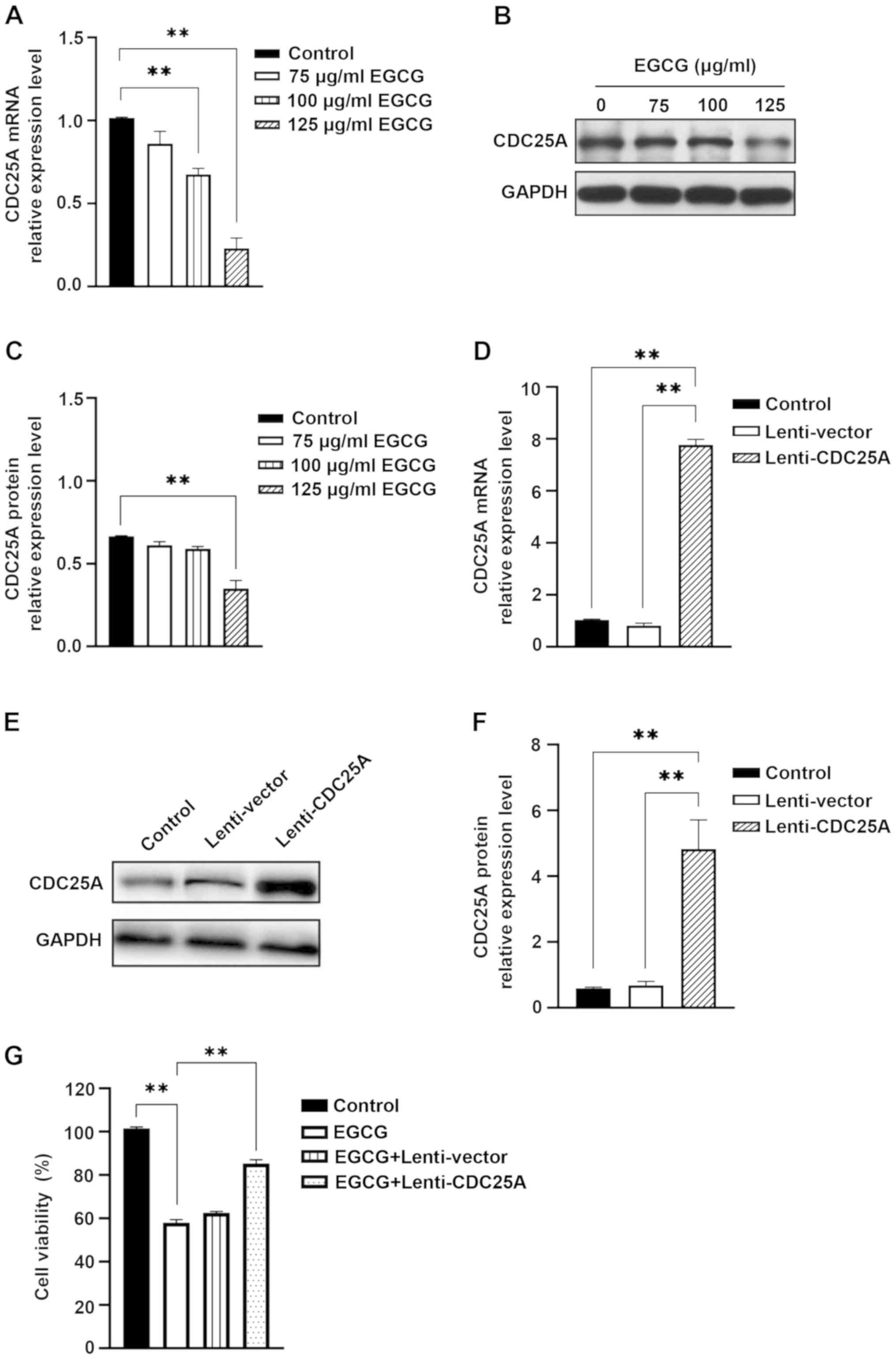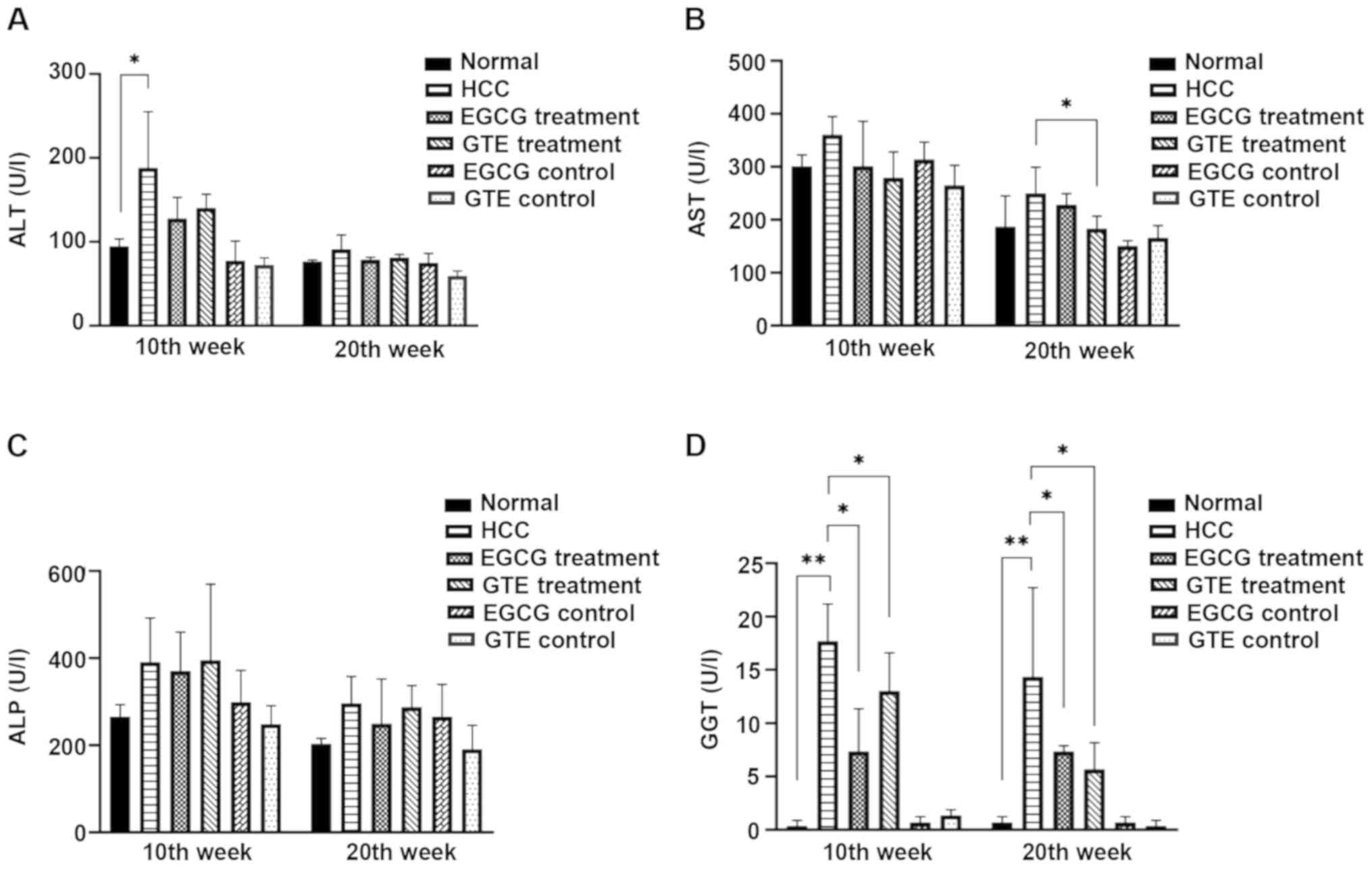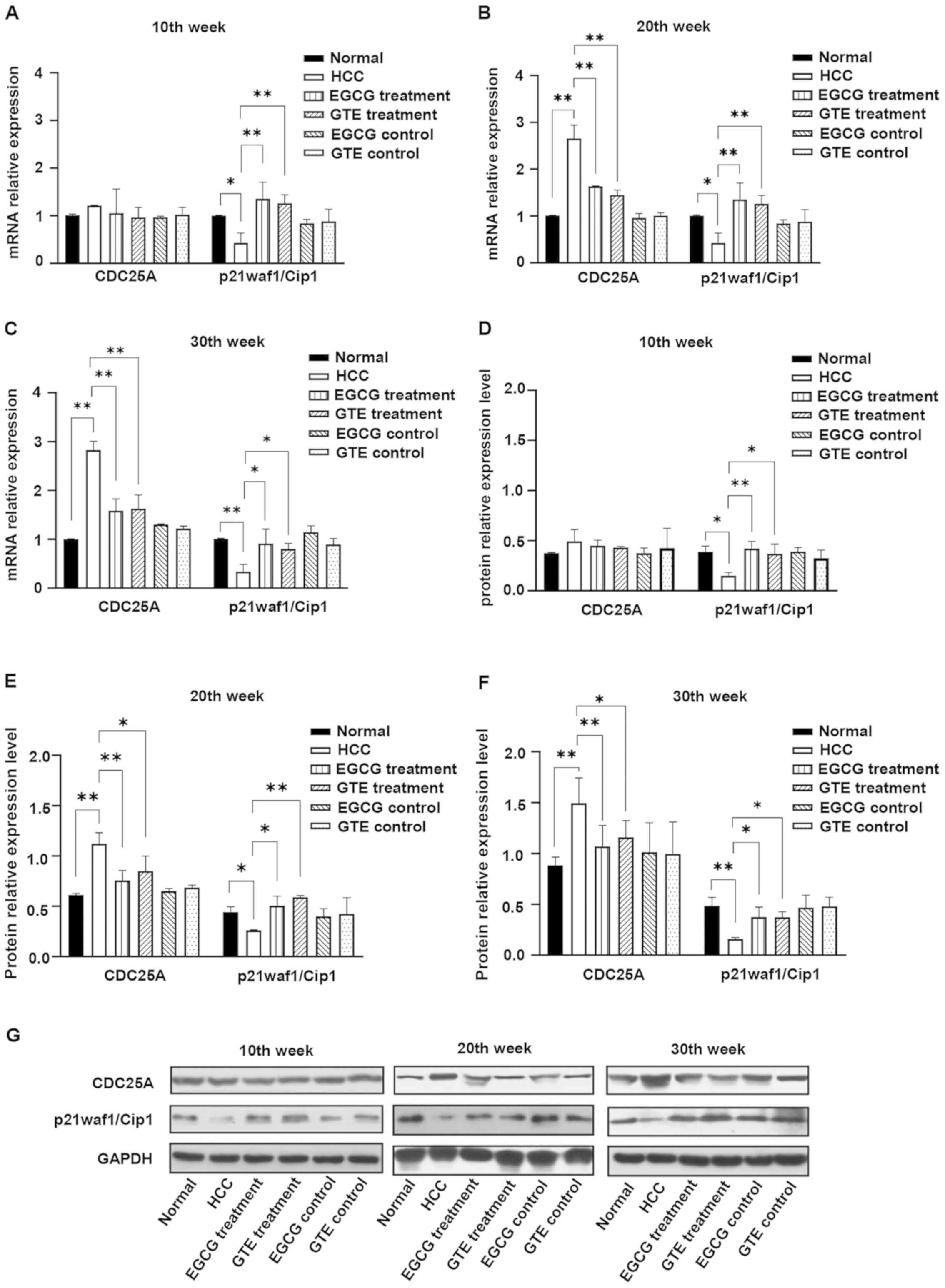|
1
|
Yang JD, Hainaut P, Gores GJ, Amadou A,
Plymoth A and Roberts LR: A global view of hepatocellular
carcinoma: Trends, risk, prevention and management. Nat Rev
Gastroenterol Hepatol. 16:589–604. 2019. View Article : Google Scholar : PubMed/NCBI
|
|
2
|
Chen W, Zheng R, Baade PD, Zhang S, Zeng
H, Bray F, Jemal A, Yu XQ and He J: Cancer statistics in China,
2015. CA Cancer J Clin. 66:115–132. 2016. View Article : Google Scholar : PubMed/NCBI
|
|
3
|
Personeni N, Pressiani T, Bozzarelli S and
Rimassa L: Targeted agents for second-line treatment of advanced
hepatocellular carcinoma. World J Gastrointest Oncol. 11:788–803.
2019. View Article : Google Scholar : PubMed/NCBI
|
|
4
|
Ilamathi M, Santhosh S and
Sivaramakrishnan V: Artesunate as an anti-cancer agent targets
stat-3 and favorably suppresses hepatocellular carcinoma. Curr Top
Med Chem. 16:2453–2463. 2016. View Article : Google Scholar : PubMed/NCBI
|
|
5
|
Qian YY, Liu ZS, Yan HJ, Yuan YF, Levenson
AS and Li K: Pterostilbene inhibits MTA1/HDAC1 complex leading to
PTEN acetylation in hepatocellular carcinoma. Biomed Pharmacother.
101:852–859. 2018. View Article : Google Scholar : PubMed/NCBI
|
|
6
|
Gan RY, Li HB, Sui ZQ and Corke H:
Absorption, metabolism, anti-cancer effect and molecular targets of
epigallocatechin gallate (EGCG): An updated review. Crit Rev Food
Sci Nutr. 58:924–941. 2018. View Article : Google Scholar : PubMed/NCBI
|
|
7
|
Liu X, Xu W, Cai H, Gao YT, Li H, Ji BT,
Shu X, Wang T, Gerszten RE, Zheng W, et al: Green tea consumption
and risk of type 2 diabetes in Chinese adults: The Shanghai Women's
health study and the Shanghai Men's health study. Int J Epidemiol.
47:1887–1896. 2018. View Article : Google Scholar : PubMed/NCBI
|
|
8
|
Quan J, Jia Z, Lv T, Zhang L, Liu L, Pan
B, Zhu J, Gelb IJ, Huang X and Tian J: Green tea extract catechin
improves cardiac function in pediatric cardiomyopathy patients with
diastolic dysfunction. J Biomed Sci. 26:322019. View Article : Google Scholar : PubMed/NCBI
|
|
9
|
Wu D, Wang J, Pae M and Meydani SN: Green
tea EGCG, T cells and T cell-mediated autoimmune diseases. Mol
Aspects Med. 33:107–118. 2012. View Article : Google Scholar : PubMed/NCBI
|
|
10
|
Liu J, Liu S, Zhou H, Hanson T, Yang L,
Chen Z and Zhou M: Association of green tea consumption with
mortality from all-cause, cardiovascular disease and cancer in a
Chinese cohort of 165,000 adult men. Eur J Epidemiol. 31:853–865.
2016. View Article : Google Scholar : PubMed/NCBI
|
|
11
|
Nakagawa T and Yokozawa T: Direct
scavenging of nitric oxide and superoxide by green tea. Food Chem
Toxicol. 40:1745–1750. 2002. View Article : Google Scholar : PubMed/NCBI
|
|
12
|
Yan RQ, Qin GZ, Chen ZY, Li Y and Qin LL:
The inhibition of green tea on the hepatocarcinogenesis induced by
aflatoxin b-1 in rats. Cancer. 2:83–87. 1987.(In Chinese).
|
|
13
|
Li Y, Qin GZ, Qin LL, Duan XX and Yan RQ:
A series of animal experiments on the prevention of liver cancer by
green tea. Cancer Res Clin. 4:22–24. 1997.(In Chinese).
|
|
14
|
Zhang ZQ, Liu QF, Huang TR, Wu YD, Zhong
SC and Yu TC: Experimental epidemiological study on the prevention
of liver cancer by green tea. Guangxi Prev Med. 1:5–7. 1995.(In
Chinese).
|
|
15
|
Shankar S, Ganapathy S, Hingorani SR and
Srivastava RK: EGCG inhibits growth, invasion, angiogenesis and
metastasis of pancreatic cancer. Front Biosci. 13:440–452. 2008.
View Article : Google Scholar : PubMed/NCBI
|
|
16
|
Hazgui S, Bonnomet A, Nawrocki-Raby B,
Milliot M, Terryn C, Cutrona J, Polette M, Birembaut P and Zahm JM:
Epigallocatechin-3-gallate (EGCG) inhibits the migratory behavior
of tumor bronchial epithelial cells. Respir Res. 9:332008.
View Article : Google Scholar : PubMed/NCBI
|
|
17
|
Cerezo-Guisado MI, Zur R, Lorenzo MJ,
Risco A, Martín-Serrano MA, Alvarez-Barrientos A, Cuenda A and
Centeno F: Implication of Akt, ERK1/2 and alternative p38MAPK
signalling pathways in human colon cancer cell apoptosis induced by
green tea EGCG. Food Chem Toxicol. 84:125–132. 2015. View Article : Google Scholar : PubMed/NCBI
|
|
18
|
Youn HS, Lee JY, Saitoh SI, Miyake K, Kang
KW, Choi YJ and Hwang DH: Suppression of MyD88- and TRIF-dependent
signaling pathways of Toll-like receptor by
(−)-epigallocatechin-3-gallate, a polyphenol component of green
tea. Biochem Pharmacol. 72:850–859. 2006. View Article : Google Scholar : PubMed/NCBI
|
|
19
|
Huang CH, Tsai SJ, Wang YJ, Pan MH, Kao JY
and Way TD: EGCG inhibits protein synthesis, lipogenesis and cell
cycle progression through activation of AMPK in p53 positive and
negative human hepatoma cells. Mol Nutr Food Res. 53:1156–1165.
2009. View Article : Google Scholar : PubMed/NCBI
|
|
20
|
Shen X, Zhang Y, Feng Y, Zhang L, Li J,
Xie YA and Luo X: Epigallocatechin-3-gallate inhibits cell growth,
induces apoptosis and causes S phase arrest in hepatocellular
carcinoma by suppressing the AKT pathway. Int J Oncol. 44:791–796.
2014. View Article : Google Scholar : PubMed/NCBI
|
|
21
|
Masuda M, Suzui M and Weinstein IB:
Effects of epigallocatechin-3-gallate on growth, epidermal growth
factor receptor signaling pathways, gene expression and
chemosensitivity in human head and neck squamous cell carcinoma
cell lines. Clin Cancer Res. 7:4220–4229. 2001.PubMed/NCBI
|
|
22
|
Lim YC and Cha YY:
Epigallocatechin-3-gallate induces growth inhibition and apoptosis
of human anaplastic thyroid carcinoma cells through suppression of
EGFR/ERK pathway and cyclin B1/CDK1 complex. J Surg Oncol.
104:776–780. 2011. View Article : Google Scholar : PubMed/NCBI
|
|
23
|
Esteban V, Vázquez-Novelle MD, Calvo E,
Bueno A and Sacristán MP: Human Cdc14A reverses CDK1
phosphorylation of Cdc25A on serines 115 and 320. Cell Cycle.
5:2894–2898. 2006. View Article : Google Scholar : PubMed/NCBI
|
|
24
|
Livak KJ and Schmittgen TD: Analysis of
relative gene expression data using real-time quantitative PCR and
the 2(-Delta Delta C(T)) method. Methods. 25:402–408. 2001.
View Article : Google Scholar : PubMed/NCBI
|
|
25
|
Vigneron A, Cherier J, Barré B, Gamelin E
and Coqueret O: The cell cycle inhibitor p21waf1 binds to the myc
and cdc25A promoters upon DNA damage and induces transcriptional
repression. J Biol Chem. 281:34742–34750. 2006. View Article : Google Scholar : PubMed/NCBI
|
|
26
|
Renner EL: Liver function tests.
Baillieres Clin Gastroenterol. 9:661–677. 1995. View Article : Google Scholar : PubMed/NCBI
|
|
27
|
Almatroodi SA, Almatroudi A, Khan AA,
Alhumaydhi FA, Alsahli MA and Rahmani AH: Potential therapeutic
targets of epigallocatechin gallate (EGCG), the most abundant
catechin in green tea, and its role in the therapy of various types
of cancer. Molecules. 25:31462020. View Article : Google Scholar
|
|
28
|
Darweish MM, Abbas A, Ebrahim MA and
Al-Gayyar MM: Chemopreventive and hepatoprotective effects of
Epigallocatechin-gallate against hepatocellular carcinoma: Role of
heparan sulfate proteoglycans pathway. J Pharm Pharmacol.
66:1032–1045. 2014. View Article : Google Scholar : PubMed/NCBI
|
|
29
|
Liang HJ, Wei W, Kang XN, Guo K, Cao J, Su
JJ, Yang C, Ou C, Li Y and Liu YK: Differentially expressed
proteins in the precancerous stage of rat hepatocarcinogenesis
induced by diethylnitrosamine. Zhonghua Gan Zang Bing Za Zhi.
17:669–674. 2009.(In Chinese). PubMed/NCBI
|
|
30
|
Yoshizawa S, Horiuchi T, Fujiki H, Yoshida
T, Okuda T and Sugimura T: Antitumor promoting activity of
(−)-epigallocatechin gallate, the main constituent of ‘Tannin’ in
green tea. Phytother Res. 1:44–47. 1987. View Article : Google Scholar
|
|
31
|
Wang ZY, Hong JY, Huang MT, Reuhl KR,
Conney AH and Yang CS: Inhibition of N-nitrosodiethylamine- and
4-(methylnitrosamino)-1-(3-pyridyl)-1-butanone-induced
tumorigenesis in A/J mice by green tea and black tea. Cancer Res.
52:1943–1947. 1992.PubMed/NCBI
|
|
32
|
Xu Q, Yang CH, Liu Q, Jin XF, Xu XT, Tong
JL, Xiao SD and Ran ZH: Chemopreventive effect of
epigallocatechin-3-gallate (EGCG) and folic acid on the
N-methyl-N′-nitro-N-nitrosoguanidine (MNNG)-induced
gastrointestinal cancer in rat model. J Dig Dis. 12:181–187. 2011.
View Article : Google Scholar : PubMed/NCBI
|
|
33
|
Gupta S, Hastak K, Ahmad N, Lewin JS and
Mukhtar H: Inhibition of prostate carcinogenesis in TRAMP mice by
oral infusion of green tea polyphenols. Proc Natl Acad Sci USA.
98:10350–10355. 2001. View Article : Google Scholar : PubMed/NCBI
|
|
34
|
Chen L, Lee MJ, Li H and Yang CS:
Absorption, distribution, elimination of tea polyphenols in rats.
Drug Metab Dispos. 25:1045–1050. 1997.PubMed/NCBI
|
|
35
|
Kale A, Gawande S, Kotwal S, Netke S,
Roomi W, Ivanov V, Niedzwiecki A and Rath M: Studies on the effects
of oral administration of nutrient mixture, quercetin and red
onions on the bioavailability of epigallocatechin gallate from
green tea extract. Phytother Res. 24 (Suppl 1):S48–S55. 2010.
View Article : Google Scholar : PubMed/NCBI
|
|
36
|
Ding YF, Wu ZH, Wei YJ, Shu and Peng YR:
Hepatic inflammation-fibrosis-cancer axis in the rat hepatocellular
carcinoma induced by diethylnitrosamine. J Cancer Res Clin Oncol.
143:821–834. 2017. View Article : Google Scholar : PubMed/NCBI
|
|
37
|
Cha JH, Bae SH, Kim HL, Park NR, Choi ES,
Jung ES, Choi JY and Yoon SK: Branched-chain amino acids ameliorate
fibrosis and suppress tumor growth in a rat model of hepatocellular
carcinoma with liver cirrhosis. PLoS One. 8:e778992013. View Article : Google Scholar : PubMed/NCBI
|
|
38
|
Xu M, Zhao Q, Shao D, Liu H, Qi J and Qin
C: Chenodeoxycholic acid derivative HS-1200 inhibits
hepatocarcinogenesis and improves liver function in
diethylnitrosamine-exposed rats by downregulating MTH1. Biomed Res
Int. 2017:14659122017.PubMed/NCBI
|
|
39
|
Xu XS, Wan Y, Song SD, Chen W, Miao RC,
Zhou YY, Zhang LQ, Qu K, Liu SN, Zhang YL, et al: Model based on
γ-glutamyltransferase and alkaline phosphatase for hepatocellular
carcinoma prognosis. World J Gastroenterol. 20:10944–10952. 2014.
View Article : Google Scholar : PubMed/NCBI
|
|
40
|
Yao D, Jiang D, Huang Z, Lu J, Tao Q, Yu Z
and Meng X: Abnormal expression of hepatoma specific gamma-glutamyl
transferase and alteration of gamma-glutamyl transferase gene
methylation status in patients with hepatocellular carcinoma.
Cancer. 88:761–769. 2000. View Article : Google Scholar : PubMed/NCBI
|
|
41
|
Shaarawy SM, Tohamy AA, Elgendy SM,
Elmageed ZY, Bahnasy A, Mohamed MS, Kandil E and Matrougui K:
Protective effects of garlic and silymarin on NDEA-induced rats
hepatotoxicity. Int J Biol Sci. 5:549–557. 2009. View Article : Google Scholar : PubMed/NCBI
|
|
42
|
Ma H, Zhang L, Tang B, Wang Y, Chen R,
Zhang B, Chen Y, Ge N, Wang Y, Gan Y, et al:
γ-Glutamyltranspeptidase is a prognostic marker of survival and
recurrence in radiofrequency-ablation treatment of hepatocellular
carcinoma. Ann Surg Oncol. 21:3084–3089. 2014. View Article : Google Scholar : PubMed/NCBI
|
|
43
|
Lee SI, Kim HJ and Boo YC: Effect of green
tea and (−)-epigallocatechin gallate on ethanol-induced toxicity in
HepG2 cells. Phytother Res. 22:669–674. 2008. View Article : Google Scholar : PubMed/NCBI
|
|
44
|
Yang GY, Liao J, Kim K, Yurkow EJ and Yang
CS: Inhibition of growth and induction of apoptosis in human cancer
cell lines by tea polyphenols. Carcinogenesis. 19:611–616. 1998.
View Article : Google Scholar : PubMed/NCBI
|
|
45
|
Liang YC, Lin-shiau SY, Chen CF and Lin
JK: Suppression of extracellular signals and cell proliferation
through EGF receptor binding by (−)-epigallocatechin gallate in
human A431 epidermoid carcinoma cells. J Cell Biochem. 67:55–65.
1997. View Article : Google Scholar : PubMed/NCBI
|
|
46
|
Gupta S, Hastak K, Afaq F, Ahmad N and
Mukhtar H: Essential role of caspases in
epigallocatechin-3-gallate-mediated inhibition of nuclear factor
kappa B and induction of apoptosis. Oncogene. 23:2507–2522. 2004.
View Article : Google Scholar : PubMed/NCBI
|
|
47
|
Berger SJ, Gupta S, Belfi CA, Gosky DM and
Mukhtar H: Green tea constituent (−-)-epigallocatechin-3-gallate
inhibits topoisomerase I activity in human colon carcinoma cells.
Biochem Biophys Res Commun. 288:101–105. 2001. View Article : Google Scholar : PubMed/NCBI
|
|
48
|
Lu X, Sun W, Tang Y, Zhu L, Li Y, Ou C,
Yang C, Su J, Luo C, Hu Y and Cao J: Identification of key genes in
hepatocellular carcinoma and validation of the candidate gene,
cdc25a, using gene set enrichment analysis, meta-analysis and
cross-species comparison. Mol Med Rep. 13:1172–1178. 2016.
View Article : Google Scholar : PubMed/NCBI
|
|
49
|
Terada Y, Tatsuka M, Jinno S and Okayama
H: Requirement for tyrosine phosphorylation of Cdk4 in G1 arrest
induced by ultraviolet irradiation. Nature. 376:358–362. 1995.
View Article : Google Scholar : PubMed/NCBI
|
|
50
|
Shen T and Huang S: The role of Cdc25A in
the regulation of cell proliferation and apoptosis. Anticancer
Agents Med Chem. 12:631–639. 2012. View Article : Google Scholar : PubMed/NCBI
|
|
51
|
Bartek J and Lukas J: Mammalian G1- and
S-phase checkpoints in response to DNA damage. Curr Opin Cell Biol.
13:738–747. 2001. View Article : Google Scholar : PubMed/NCBI
|
|
52
|
Lindqvist A, Rodríguez-Bravo V and Medema
RH: The decision to enter mitosis: Feedback and redundancy in the
mitotic entry network. J Cell Biol. 185:193–202. 2009. View Article : Google Scholar : PubMed/NCBI
|
|
53
|
Lavarone A and Massagué J: Repression of
the CDK activator Cdc25A and cell-cycle arrest by cytokine TGF-beta
in cells lacking the CDK inhibitor p15. Nature. 387:417–422. 1997.
View Article : Google Scholar : PubMed/NCBI
|
|
54
|
Liang J, Cao R, Zhang Y, Xia Y, Zheng Y,
Li X, Wang L, Yang W and Lu Z: PKM2 dephosphorylation by Cdc25A
promotes the Warburg effect and tumorigenesis. Nat Commun.
7:124312016. View Article : Google Scholar : PubMed/NCBI
|
|
55
|
Yamashita Y, Kasugai I, Sato M, Tanuma N,
Sato I, Nomura M, Yamashita K, Sonoda Y, Kumabe T, Tominaga T, et
al: CDC25A mRNA levels significantly correlate with Ki-67
expression in human glioma samples. J Neurooncol. 100:43–49. 2010.
View Article : Google Scholar : PubMed/NCBI
|
|
56
|
Singh L, Pushker N, Sen S, Singh MK,
Bakhshi S, Chawla B and Kashyap S: Expression of CDC25A and CDC25B
phosphatase proteins in human retinoblastoma and its correlation
with clinicopathological parameters. Br J Ophthalmol. 99:457–463.
2015. View Article : Google Scholar : PubMed/NCBI
|
|
57
|
Brunetto E, Ferrara AM, Rampoldi F,
Talarico A, Cin ED, Grassini G, Spagnuolo L, Sassi I, Ferro A,
Cuorvo LV, et al: CDC25A protein stability represents a previously
unrecognized target of HER2 signaling in human breast cancer:
Implication for a potential clinical relevance in trastuzumab
treatment. Neoplasia. 15:579–590. 2013. View Article : Google Scholar : PubMed/NCBI
|
|
58
|
Weiss RH: p21Waf1/Cip1 as a therapeutic
target in breast and other cancers. Cancer Cell. 4:425–429. 2003.
View Article : Google Scholar : PubMed/NCBI
|
|
59
|
Harper JW, Adami GR, Wei N, Keyomarsi K
and Elledge SJ: The p21 Cdk-interacting protein Cip1 is a potent
inhibitor of G1 cyclin-dependent kinases. Cell. 75:805–816. 1993.
View Article : Google Scholar : PubMed/NCBI
|
|
60
|
Abbas T and Dutta A: p21 in cancer:
Intricate networks and multiple activities. Nat Rev Cancer.
9:400–414. 2009. View Article : Google Scholar : PubMed/NCBI
|
|
61
|
Zhang X, Min KW, Wimalasena J and Baek SJ:
Cyclin D1 degradation and p21 induction contribute to growth
inhibition of colorectal cancer cells induced by
epigallocatechin-3-gallate. J Cancer Res Clin Oncol. 138:2051–2060.
2012. View Article : Google Scholar : PubMed/NCBI
|
|
62
|
Liu X, Zhang DY, Zhang W, Zhao X, Yuan C
and Ye F: The effect of green tea extract and EGCG on the signaling
network in squamous cell carcinoma. Nutr Cancer. 63:466–475. 2011.
View Article : Google Scholar : PubMed/NCBI
|
|
63
|
Rawangkan A, Wongsirisin P, Namiki K, Iida
K, Kobayashi Y, Shimizu Y, Fujiki H and Suganuma M: Green tea
catechin is an alternative immune checkpoint inhibitor that
inhibits PD-L1 expression and lung tumor growth. Molecules.
23:20712018. View Article : Google Scholar
|





















